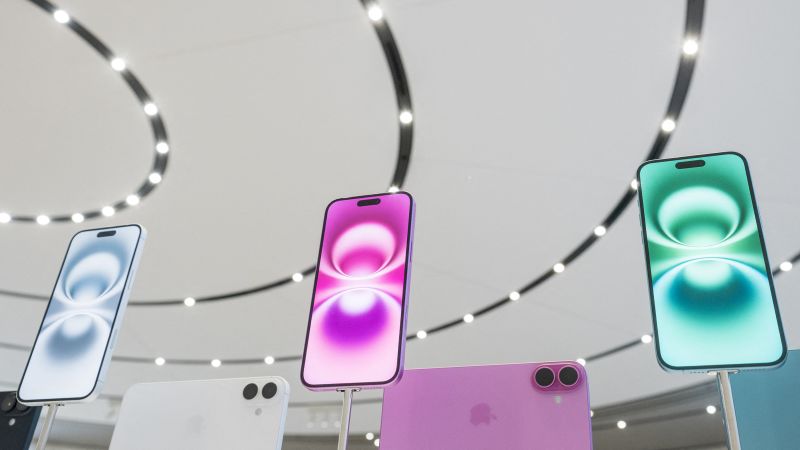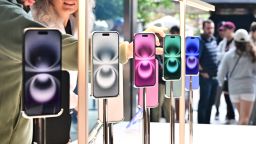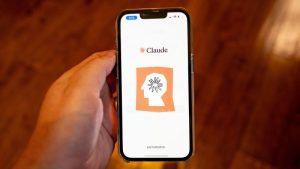Apple wants its AI iPhone to turn around a sales rut. Here’s how it’s going so far

—
Apple CEO Tim Cook said the company’s Apple Intelligence AI tools would “supercharge” the iPhone 16 when he introduced the new device last month. On Thursday, the world got its first glimpse of what Apple’s artificial intelligence technology has meant for iPhone sales.
iPhone sales for the three months ended in September modestly beat analyst expectations, according to numbers released by the company on Thursday. iPhone sales reached $46.2 billion, up more than 5.5% from the same period in the prior year, according to Apple’s earnings report after the bell.
Here’s why that matters: Apple’s third quarter earnings results include the just over two weeks of sales figures since iPhone 16 preorders opened on September 13. (Devices officially landed on shelves September20.)
While that’s only a sliver of what will end up being the iPhone 16’s total lifetime sales, it provides an important early look at demand for the device that Apple has been hoping would turn around a years-long sales rut. Apple’s overall revenue declined year-over-year for four straight quarters last year, in part because of weak iPhone demand and widespread economic uncertainty.
After repeatedly failing to give consumers an exciting reason to upgrade, some analysts believe Apple Intelligence, a software upgrade that insertedartificial intelligence features throughout the iPhone 16, could spur a sales “supercycle” that the company sorely wants.
Apple’s third quarter iPhone sales figure includes sales of earlier iPhone models that happened during the quarter, too, but indicates that the iPhone 16 helped raise sales slightly. In the year-ago quarter, when the iPhone 15 launched, iPhone sales grew about 2.8% year-over-year.
The improved iPhone sales growth helped drive up the company’s overall sales by 6% year-over-year to $94.9 billion, slightly higher than analysts had predicted, although profits fell by 35% compared to the year-ago quarter.
On Thursday’s earnings call, Cook said the Apple Intelligence update is already compelling for consumers.
“(iOS) 18.1 has twice the adoption rate of (iOS) 17.1,” Cook said. “So that clearly shows a level of interest out there.”
Apple shares (AAPL) dipped around 1% inafter-hours trading following the report.
The results come after Apple this week rolled out the first Apple Intelligence features to the iPhone 16, as well as iPhone 15 Pro models, including new writing tools and the ability to record, transcribe and summarize calls. That means people who bought the iPhone 16 in the first month it was on sale didn’t have access to those AI features until just recently.
The slow drip of new capabilities and features — more Apple Intelligence offerings are expected to drop along with iOS 18.2 in December — may mean Apple fans didn’t feel a huge sense of urgency to upgrade to the iPhone 16.
Ahead of Thursday’s report, Wall Street investors were focused intently on “initial indications on how the iPhone 16 cycle is performing,” as well as the company’s sales guidance for the fourth quarter, CFRA Research analyst Angelo Zino said in a research note prior to the report.
In a statement Thursday, Cook said Apple Intelligence “sets a new standard for privacy in AI and supercharges our lineup heading into the holiday season.”
Investors were also watching sales figures in China, one of Apple’s biggest and most important markets. The iPhone maker slashed prices in China earlier this year amid stiff competition from local rivals, but analysts have hoped that the iPhone 16 could help spark a rebound, despite some hurdles to rolling out Apple Intelligence features in the region.
Third quarter sales in China were nearly flat from the year prior at just over $15 billion but fell short of the $16.1 billion analysts were hoping for, according to Refinitiv consensus estimates.
Most analysts said prior to the report that they weren’t too worried if the September sales numbers weren’t thrilling. Instead, the most important quarter — as always for Apple — will be the current, holiday quarter.
Wedbush analyst Dan Ives said in a recent investor note he believes there are roughly 300 million iPhones globally that have not been upgraded in more than four years, adding that “a monster holiday season (is) likely on deck.”
And following Thursday’s report, Emarketer analyst Jacob Bourne said that“the staggered rollout of Apple Intelligence could curtail some of the device upgrade cycle’s momentum, but the combination of robust services revenue growth and healthy iPhone 16 demand positions Apple well for the holiday season.”
CNN’s Ramishah Maruf contributed to this report.
Source: https://www.cnn.com



